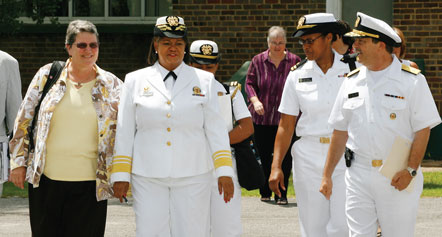
Left to right: SAMHSA Administrator Pamela S. Hyde and Surgeon General Dr. Regina M. Benjamin recently held a public forum in Bayou La Batre, AL, on the Deepwater Horizon oil spill and its behavioral health impact on the local community. Far right: James Galloway, Assistant Surgeon General and Regional Health Administrator. Photo by Mike Kittrell, Press-Register. posted July 14, 2010
Coping with the Oil Spill
By Pamela S. Hyde, J.D.
Down in the Gulf recently, I participated in several public forums with Surgeon General Dr. Regina M. Benjamin. We heard from parents, teachers, cleanup workers, fishermen, and others about how they were coping with the oil spill disaster.
Dr. Benjamin, who is from the Gulf area herself, acknowledged that “this oil spill is one of the most devastating things we’ve ever dealt with.” To help, the Surgeon General is personally carrying the message about behavioral health needs to these communities.
Despite many hardships, people in the Gulf are doing their best to stay connected with friends and with family, take care of themselves, and help their neighbors. Their resilience is phenomenal.
On July 29, I joined the Surgeon General on a conference call with Gulf Coast area Community Health Centers to address health issues, including behavioral health, related to the oil spill.
SAMHSA is coordinating with disaster relief officials, public health authorities, and behavioral health service providers in each of the affected states—Alabama, Mississippi, Louisiana, Florida, and Texas. We are providing technical support and help to assess and meet the mental health needs and related substance abuse concerns of affected communities.
SAMHSA is working hard to ensure that the money coming from BP for behavioral health—$52 million, including $10 million to SAMHSA and $42 million to the Gulf states—is put to use immediately and in the best way possible to help people. (See SAMHSA, Gulf States Receive $52 Million for Behavioral Health.)
SAMHSA is coordinating with many other operating divisions including the Assistant Secretary for Preparedness and Response, the White House, the Domestic Policy Council, as well as the Surgeon General.
This emergency is different from a natural disaster due to its technological nature. Unlike Hurricane Katrina, the devastation and dangers are under the surface of the water, often invisible. Emotional stress is evident, and substance abuse and mental health issues are on the rise.
One question that came up is “where does response end and recovery start?” For behavioral health, that is particularly fuzzy. People are asking when this ordeal will be over. When will their lives go back to normal—the way it was before this disaster happened? That question doesn’t have an answer at this time.
For now, SAMHSA is providing local communities with basics: where to get help when they need it, whom to call if a family member is depressed or drinking too much. Hotlines are in place along with SAMHSA’s Suicide Prevention Lifeline, the Treatment Locator, and a Domestic Violence Hotline (see box). And a new “800” number is under development to meet the behavioral health needs of Gulf residents resulting from the oil spill.
Here at SAMHSA, we’re all hoping for a positive outcome to this emergency as soon as possible. In the meantime, SAMHSA’s goal is to provide continuing support as communities in the Gulf face challenges as they arise.
SAMHSA Treatment Locator
1-800-662-HELP (4357)
National Suicide Prevention Lifeline
1-800-273-TALK (8255)
National Domestic Violence Hotline
1-800-799-SAFE (7233)
Note: To assist Gulf residents, a new “800” number is in development. Check SAMHSA’s Facebook, Twitter, and home page. The number should be posted soon!